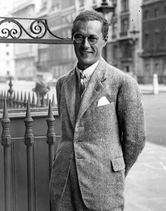Kazimierz Wierzyński

Kazimierz Wierzyński (Drohobycz, Kingdom of Galicia and Lodomeria, 27 August 1894 – 13 February 1969, London) was a Polish poet and journalist; an elected member of the prestigious Polish Academy of Literature in the Second Polish Republic.[1]
Life
Kazimierz Wierzyński was born in Drohobycz (Drohobych), Kingdom of Galicia and Lodomeria.[2] He was a co-founder, with Julian Tuwim and three other poets, of the Skamander group of experimental poets.[3] His work Olympic Laurel (Polish: Laur olimpijski, 1927),[4] which idealizes the grace and fitness of athletes, won the gold medal for poetry at the 1928 Olympic Games in Amsterdam,[5][6] and his other early poems also celebrate the joy of living.
In September 1939, after the invasion of Poland by Nazi Germany, Wierzyński and his wife Helena escaped from Poland and, via Romania, Yugoslavia, Italy, and France, eventually reached the USA, where they stayed for almost twenty years.[7]
His later works, written in exile, are more somber and socially conscious. The Bitter Crop (1933) includes poems about the United States. His Forgotten Battlefield (1944) contains narratives of World War II. He died in London, England.[8]
See also
References
| Medal record | ||
|---|---|---|
| Art competitions | ||
| 1928 Amsterdam | Lyric | |
- ^ "Polska Akademia Literatury". Encyklopedia Onet.pl, Grupa Onet. 2011. Archived from the original on September 19, 2007. Retrieved December 12, 2011.
- ^ Kazimierz Wierzyński.
- ^ Kazimierz Wierzyński.
- ^ Kazimierz Wierzyński.
- ^ Kazimierz Wierzyński profile Archived 2012-10-13 at the Wayback Machine at www.databaseolympics.com
- ^ "Kazimierz Wierzyński". Olympedia. Retrieved 25 July 2020.
- ^ Zbigniew Andres, "Kazimierz Wierzyński — An Emigrant's Fate", translated from the Polish by Agnieszka Maria Gernand, The Polish Review, vol. LV, no. 1 (2010), pp. 35-48. Accessed July 28, 2020. www.jstor.org/stable/25779860.
- ^ Kazimierz Wierzyński.
External links
- Profile of Kazimierz Wierzyński at Culture.pl
- 1894 births
- 1969 deaths
- Burials at Powązki Cemetery
- People from Drohobych
- Polish Austro-Hungarians
- Polish male writers
- Polish Rifle Squads members
- Polish Military Organisation members
- Polish legionnaires (World War I)
- Olympic gold medalists in art competitions
- Members of the Polish Academy of Literature
- Golden Laurel of the Polish Academy of Literature
- 20th-century Polish poets
- Medalists at the 1928 Summer Olympics
- 20th-century male writers
- Olympic competitors in art competitions
- People associated with the magazine "Kultura"
- Polish writer stubs
